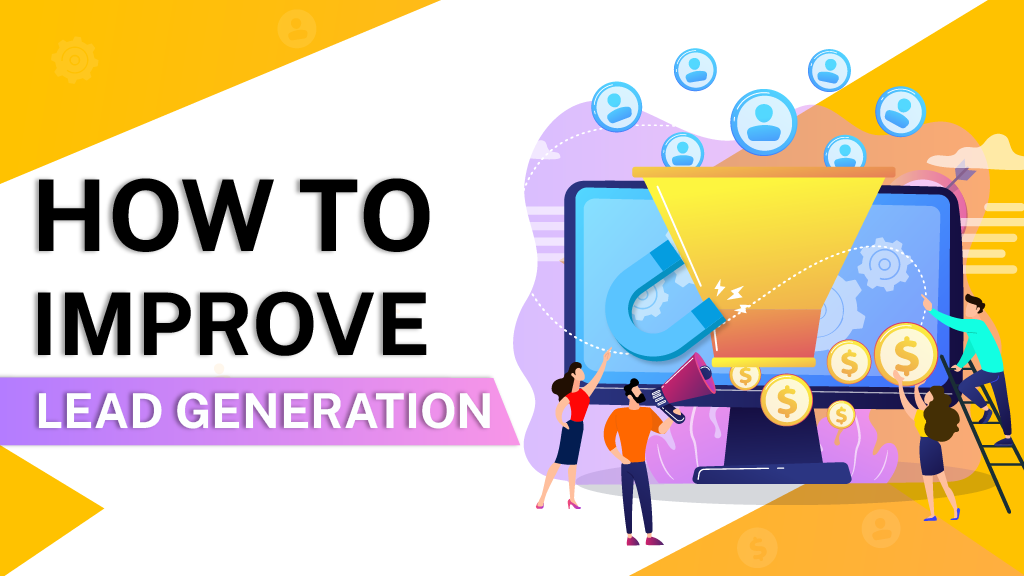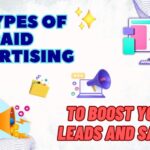Table of Contents
ToggleHigh website traffic but still struggling to get quality leads?
You can’t just bring high traffic to your website and hope that that’s enough. There are a number of steps in the lead generation process that must be taken in order to convert that traffic into leads and then into customers.
Who are the leads? A lead is a person who has shown interest in your product or services.
And lead generation is the process of generating consumer interest in your products or services. With lead generation, you can attract your potential customers and nurture them through the buying process.
Why is Lead Generation Important For Businesses?
Lead generation is a key goal for almost every business, as lead generation helps attract people and convert them into customers, which increases sales and consequently revenue.
As it draws potential clients to a business, lead generation can help raise brand awareness. Businesses can promote their goods or services and inform potential customers about their brand through a lead-generation process including content marketing, social media outreach, and targeted advertising. This can raise consumer awareness of the brand, increase b2b lead generation and aid in forming a favorable impression of it in their thoughts.
Lead generation for any business starts with the basic question, “What is your client’s need?”
Once you respond to that query and link it to a landing page, you’ll continuously produce leads. This lead still needs to be converted into a customer, but it’s a start, and it’s a lot simpler to modify your sales methods once you have a sales funnel loaded with leads.
Before diving into the pool of lead generation, let me first explain a term that you’ll frequently encounter in this blog.
Quality leads
Quality leads are prospective customers who are more likely to become customers. A successful lead generation strategy must start with quality leads, which are also essential for overall business expansion. Businesses can prioritise quality leads to maximise their efforts and resources, increasing their chances of a high conversion rate and making more sales.
Types of Lead Generation
Marketing qualified lead (MQL)
MQL is an individual who has indicated an interest in your marketing campaigns or initiatives, but is not intended to consider a sales qualified lead (SQL). They are considered “warmer” leads and designated as more likely to become customers compared to a general lead. They are passed from the marketing team to the sales team for further nurturing. They are evaluated on the basis of their activities such as filling out forms, downloading or attending an event.
Sales qualified lead (SQL)
SQL is a prospect who has expressed strong interest in your product or services and is deemed ready for further sales interaction. They are considered “hot” leads and is prioritized for immediate follow-up by the sales team to convert them into a customer. The evaluation for an SQL varies from company to company depending upon various factors such as budget, authority, need, and timeline (BANT).
Product qualified lead (PQL)
PQL is a potential customer who has been engaged with a company’s product or service, typically through actions such as a free trial, product demos, or some first-hand experience. PQLs are more likely to become customers as they have already experienced and understand the value of your company’s product or service.
Service qualified lead (SQL)
SQL is a prospective customer who has indicated an interest in a company’s services and is ready to take the conversation with the service provider further. They seemed to be a good fit for the service offered by your organization and are more likely to convert into customers. Although the requirements for a SQL can vary, they frequently involve factors like prior service inquiries, engagement with service-related information, and general suitability for the services offered.
Now you understand your prospects, their needs, and their stages, but the problem is that they are prospects and not just an individual prospect. It’s very hard to remember every prospect’s stage or to carve it on the stone like in ancient times. So, you require a digital solution for this, and that’s where lead scoring does its magic.
Lead scoring is a technique for sorting leads and assigning a numerical value based on how valuable they may be to your company. It helps in improving your lead generation and makes the lead generation process much easier. It involves assigning the leads numerical values, or scores, depending on particular factors such as behaviour, information, and demographic data, as well as engagement with your brand, such as website visits, email opens, and downloads of resources.
Businesses can more efficiently allocate resources and set priorities for their follow-up activities with the aid of lead scoring. Businesses can improve their chances of turning leads into customers by selecting the best leads and concentrating sales efforts on them. The lead generation process can be streamlined, and your sales and marketing activities can be more productive, by using lead scoring.
Lead Generation Channels
Lead generation differs depending on the industry, the targeted audience, and the campaign objective, and so do their channels. Below, we have mentioned some of the lead generation channels that can help you find your leads, or I can say that it will help them to find you.
- Email campaign: It is one of the most effective ways to reach out to loyal and prospective customers directly in their inboxes. Email outreach helps you target the audience with personalised messages and build relationships with them in a cost-effective way.
- Social media: One of the most effective and interactive ways to connect with potential customers is through social media platforms. It also encourages your followers to share their experiences, which helps build credibility for your brand.
44% of B2B marketers say they get leads from LinkedIn, while 39% get them from Facebook.
- Company blog: A company blog offers compelling and informative material about your products, services, or industry and arouses attention among readers. Regularly publishing a blog can help you engage your potential customers and act as a lead magnet.
- Digital ads: Digital ads can be an incredibly effective lead-generation tool to reach a large audience in very little time. An ad on a digital platform can be precisely targeted with dynamic creative and measurable results
- Live event/seminar/webinar: There are various lead magnets, such as a live event, seminar, or webinar, that can act as magnets to attract leads for your business. It can be very effective if it is well executed, planned, and promoted to target the right audience. they also work as the best lead generation tool for b2b lead generation.
- Website landing pages: It’s very important to keep your website landing page updated and user-friendly, as it plays a vital role in your lead generation process for your digital audience. A call-to-action (CTA) on your website encourages the visitor to take the next step, such as filling out the form, downloading something, or scheduling a call.
Tips on How to Generate Leads or how to increase Lead Generation
1. Identify the targeted audience
The effectiveness of any lead generation process depends on accurately identifying the target market. It can be done by identifying their demographics (age, income, etc.), psychographics (lifestyle, interests, etc.), behaviour (search history, purchase history, etc.), and many more.
Evaluating this data can help your businesses adapt their b2b lead generation efforts to successfully reach their intended audience and construct a profile of their ideal consumer. By doing this, you may have a greater chance of generating high-quality leads that are more likely to become customers.
2. Offer value to users
Attract customers by providing special offers or free trials, extending subscriptions, informative social media posts, or infographics. It helps you build trust and strong relationships among existing as well as new customers and increase lead generation.
3. Write compelling content
Provide your potential customers with helpful information and educate them about your product or services by writing blogs and articles. By consistently publishing high-quality content, a brand can be established as a trusted source of information, create brand awareness, attract website traffic, and work as a solution provider.
For example, if you are selling herbal soaps, write a blog about the herbs soap is made of, its benefits, or why it is different from other herbal soaps.
4. Work on the landing page
The landing page is critical in converting a user into a customer. Perhaps it’s very important to keep your landing page updated and user-friendly. It should be clean, simple, appealing, easy-to-read, with a clear value offer, attention-grabbing headlines, and a powerful call-to-action (CTA). The page should not be filled only with contents; it must also have images and graphics to make it more appealing.
5. Personalize your approach
Customize your lead generation strategies to the unique requirements and preferences of each prospective client. Personalization is the best lead generation tool which can boost lead conversion chances and engagement based on individual needs and interests.
6. Experiment with approaches and see what works best
Different approaches to attracting more leads can optimise lead generation efforts and aid in the analysis of each approach’s results. You can test different messages, message channels, offers, landing page designs, or new lead magnets such as webinars, eBooks, contests, giveaways, etc.
7. Establish a social media presence
With each passing year, social media is growing in popularity and acts as the best lead generation tool. Being actively present on social media platforms and posting relevant content creates a personal level of interaction with your followers and subscribers. Connect with them regularly by replying to the comment and directing them to your site to increase your click-through rate.
8. Create an eye-popping call-to-action (CTA)
A click on the CTA is what you wish for your business’s growth. For more clicks, place CTAs on every page (blog, social media, website, etc.), keep the text on the CTA button clear and concise, use contrasting colours, and place it prominently on the page. It must create a sense of urgency so that the user must act now and should be hyperlinked to the landing page of your website to convert the user into a customer.
9. Maintain and develop relationships
Once contact information is shared, make sure you keep your customers aware of your brand and informed about the latest offers. Keep in touch with them regularly through marketing techniques such as email marketing, PPC ads, social media, and other channels to keep them engaged. Use metrics to measure the effectiveness of your relationship-building efforts and optimise them to increase lead generation results.
10. Use SEO to increase traffic
As previously stated, increasing traffic to your website will bring your lead generation process halfway. Search engine optimization (SEO) will improve your visibility on search engines by using relevant keywords, building high-quality backlinks, using a meta description that includes a call-to-action, and many other strategies.
Lead Generation Challenges
Attracting potential customers and converting them into actual leads can be a challenging process. Now that you know some essential strategies for the lead generation process, let’s also discuss some of the challenges you might face during this process.
- Lack of quality leads: Getting a lot of leads is critical, but it’s even more crucial to make sure that those leads are high-quality and relevant.
- Measuring and tracking the result: Since lead generation is a lengthy process, it can be challenging to monitor the success of individual initiatives and gauge how they affect the expansion of a company as a whole.
- Time-consuming: Sometimes your lead isn’t a good fit, so time invested in converting these leads into consumers can go to waste if they back off at the last stage.
- Competition: Generating more leads than your competitor is vital for your business’s success. You must think out of the box and bring a unique lead generation strategy to stand out among your competitors.
- Limited resources: Many businesses (smaller or start-ups) may have limited resources, such as time, budget, manpower, and many more, which can make it challenging to achieve the desired results.
- Hard to target the right audience: It can be challenging to identify and contact the correct target audience, particularly if that demographic is continually shifting or hard to reach. Sending the wrong message to a lead at the wrong time can completely ruin the relationship.
- Difficult to measure lead score: Lead generation works on lead scoring; a numeric value is assigned based on a lead’s level of interest and engagement in your product or service. Sometimes users may reach the last stage of consuming a product or service provided by your business and lose interest at the end.
Wrap-up tips
Your lead-generating process needs to be optimized constantly. Make sure that you are making adjustments and improving it all the time; if not, then your competitors are.
The only surefire way to stay competitive and generate as many leads as possible is to reach out to both existing and new customers via various channels. In other words, never take a passive approach to the lead generation process. No matter how long you’ve been in the market, you never know how a certain adjustment will exceed your current setup and fill your funnel with leads.
Why us?
Apto Digital is one of the leading Digital Marketing Agency in Bangalore, India. With the best-skilled digital marketing experts, we bestow an incredible lifestyle of working for our clients by aligning their revolutionary ideas and helping them successfully achieve their objectives.
Our Experts have over 5 years of experience in digital marketing services. We at Apto have meta expertise in Search Engine Marketing, Search Engine Optimization, UI UX Design, Social Media Marketing, Pay Per Click Services, Email Marketing Services, Website Design and Website Development. With our fortune of expertise and digital lifestyle, we provide very cost-friendly digital marketing solutions with higher ROI for enterprises, SMEs, and startup’s.








